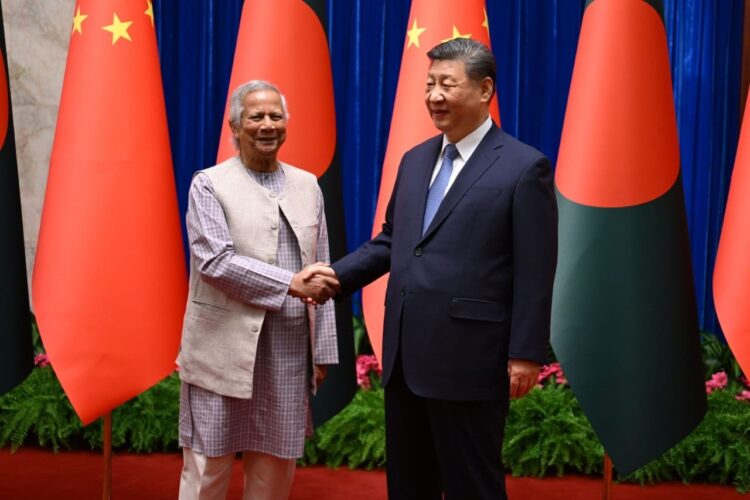While pitching for China’s economic expansion during his four-day visit to China, Bangladesh’s interim government’s chief advisor, Professor Muhammad Yunus, has said that with Northeast India as landlocked, Bangladesh is the “only guardian of the ocean for all this region.”
Video clips of his speech were shared by the interim government on its social media handles, in which Yunus said, “Seven states of India, the eastern part of India, called seven sisters… they are landlocked countries, landlocked regions of India. They have no way to reach out to the ocean.”
“We are the only guardian of the ocean for all this region. So this opens up a huge possibility. So this could be an extension of the Chinese economy. Build things, produce things, market things, bring things to China, and bring them out to the whole rest of the world,” Yunus added.
This statement of Yunus has sparked concerns in India because access to and from the Northeast states is only from the narrow corridor in north Bengal known as the ‘Chicken’s Neck,’ which has always been a challenge, economically and strategically.
Over the past years, this issue formed an important topic of discussion between Delhi and Dhaka as it worked with the previous government led by former Prime Minister Sheikh Hasina on ways to transit through Bangladesh. But with the sudden regime change in Dhaka, India’s concerns regarding the northeastern region have risen tremendously.
For now, India has not reacted to Yunus’s statement.
Why is India’s Northeast Region Significant?
The Northeastern states of India, known as the “Seven Sisters” (Arunachal Pradesh, Assam, Manipur, Meghalaya, Mizoram, Nagaland, and Tripura), are landlocked and connected to the rest of India only through a narrow passage called the Siliguri Corridor or “Chicken’s Neck.” This corridor, just 22 km wide at its narrowest point, is surrounded by Bangladesh, Nepal, and Bhutan, with Chinese-occupied Tibet nearby.
This dependency on a single route makes the region vulnerable. If tensions rise with China or radical elements gain control, the Northeast could be completely cut off. Additionally, poor connectivity makes it hard for the region to export its agricultural and horticultural products.
To ease transportation, India has signed agreements with Bangladesh to use its roads, railways, rivers, and ports. However, these agreements depend on Bangladesh’s cooperation. If an unfriendly government takes charge in Dhaka or Islamist groups influence policy, these routes could be blocked, just as they were after the 1965 war with Pakistan.
Moreover, radicalized elements in the corridor itself could disrupt transportation, cutting off the Northeast. This poses a serious national security risk. Therefore, India must not rely solely on Bangladesh for access to the Northeast and should explore alternative routes.
How Can China’s Expansion in Northeast India Be A Threat?
While China has been India’s largest trading partner, the two nations have also extended their strategic and military relations. China still poses severe threats if it considers Yunus’ suggestion. Here are some of the strategic and security threats that could arise if China enters Northeast India via Bangladesh.
1. Encirclement & Geopolitical Pressure (String of Pearls Strategy)
China has been expanding its influence in South Asia by investing in infrastructure projects and forming closer ties with India’s neighbors, including Bangladesh, Nepal, and Myanmar.
If China gains a stronger foothold in Bangladesh, it could extend its influence into India’s northeast, creating a strategic encirclement of India.
2. Military & Border Security Threats
The Northeast shares a long and sensitive border with China, including the Arunachal Pradesh region, which China claims as part of “South Tibet.”
Increased Chinese presence near the northeastern states could make it easier for China to conduct intelligence operations and support insurgencies in the region.
3. Influence over Key Trade & Connectivity Routes
The Northeast is crucial for India’s connectivity with Southeast Asia, particularly through the Act East Policy.
China could use its influence in Bangladesh to disrupt India’s trade routes and infrastructure projects like the Kaladan Multi-Modal Transit Transport Project and the India-Myanmar-Thailand Trilateral Highway.
4. Impact on India’s Relations with Bangladesh
While India and Bangladesh shared strong ties during Sheikh Hasina’s regime, China’s deeper economic and political engagement with Yunus’ government could tilt Dhaka’s foreign policy towards Beijing.
This could weaken India’s strategic advantage in the region and potentially limit India’s access to Bangladesh’s ports and trade routes.
5. Potential Support for Insurgency & Destabilization
The Northeast has a history of insurgent movements, and China has been accused in the past of providing indirect support to these groups.
A greater Chinese presence in Bangladesh could lead to an increase in arms supply and funding to separatist movements in states like Nagaland, Manipur, and Assam.
6. Infrastructure Domination & Debt-Trap Diplomacy
If China builds strategic infrastructure in Bangladesh (like roads, ports, and railways), it could control key access points to India’s northeastern states.
Bangladesh may also fall into China’s debt-trap diplomacy, making it more dependent on Beijing and reducing India’s leverage over Dhaka.
China’s expansion into the Northeast via Bangladesh would not just be an economic move but a strategic play to weaken India’s security, border stability, and influence in the region. India needs to counter this by strengthening ties with Bangladesh, improving connectivity in the Northeast, and enhancing military preparedness in border areas.
Experts Remarks
While commenting on Yunus’ latest statement about Northeast India, former High Commissioner of India to Bangladesh Veena Sikri called it ‘shocking.’ While talking to the media, she said, “Very shocking statement by Chief Adviser Muhammad Yunus. He has absolutely no right to make a statement like that.”

She added, “He knows that the northeast is an integral part of India, and we have had very close discussions with the Government of Bangladesh on access by Northeast India to the Bay of Bengal, and there are formal agreements on this… We must condemn the statement… I can tell Bangladesh one thing very clearly: if they are not interested in giving connectivity rights to Northeast India, then they cannot expect any rights as a riparian. So they should know this very clearly, and they should not have any illusions about this.”

On the other hand, while giving a subtle warning to Yunus, defense expert Praful Bakshi said, “Yunus thinks that he’ll involve China to create problems in 7 N-E states. They’re already at it with many other agencies. The Indian government won’t make noise. The government has already gotten into action. Even Yunus knows what India is going to do”.

















Comments